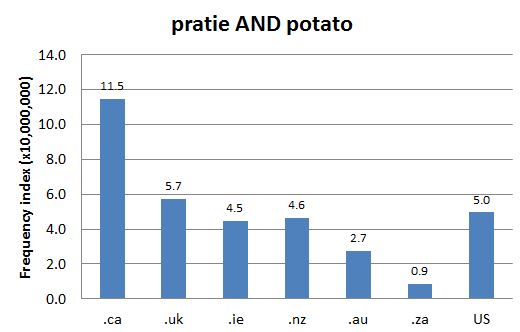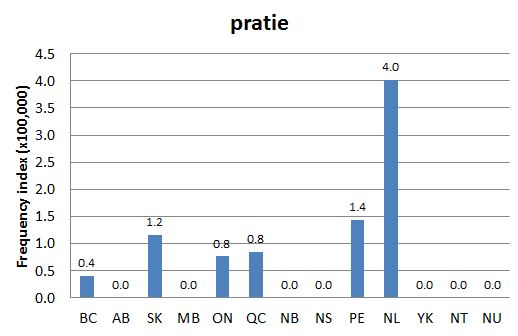DCHP-2
pratie tatie, praitie, prittie DCHP-2 (October 2016)
1 n. — Food, especially Newfoundland & Prince Edward Island
a potato.
Type: 2. Preservation — Pratie is a preservation from Irish English, where it is attested as far back as 1749 (see OED-3, s.v. "pratie"). The term has been preserved in Canada, where it has the highest frequency (see Chart 1) and is found in the Dictionary of Newfoundland English with an early quotation from 1904 (see DNE, s.v. "pratie", which is marked as Irish). An earlier quotation is found in DARE from 1837 (see DARE, s.v. "pratie", which is marked "Ir dial var of potato". Within Canada, the term is attested most frequently in Newfoundland and Prince Edward Island (see Chart 2). The importance (and renown) of Prince Edward Island potatoes, given the island's naturally enriched and thus red soil, is well-known in Canada. In the Maritimes more generally, the term is attested the earliest (see the 1842 quotation).
See also COD-2, s.v. "pratie", marked "esp Cdn (Nfld) & Irish".2 n. — in figurative use, historical, rare
an inexperienced person.
Type: 3. Semantic Change — A semantic change from an important food staple, which the potato was in the early to mid 19th century, especially in the Irish context, to the human domain. With the decrease in agricultural importance, the potato lost its appeal as a source for figurative, metaphorical uses (but note the prevalence of "couch potato").- The 1885 quote is the sole attestation we know of. Because of the historical interest and the more precarious data situation for the 19th century, the meaning is presented for the time being, although it may be a nonce formation (term only attested once).
Images:
Chart 1: Internet Domain Search, 20 May 2014
Chart 2: Regional Domain Search, 20 May 2014

